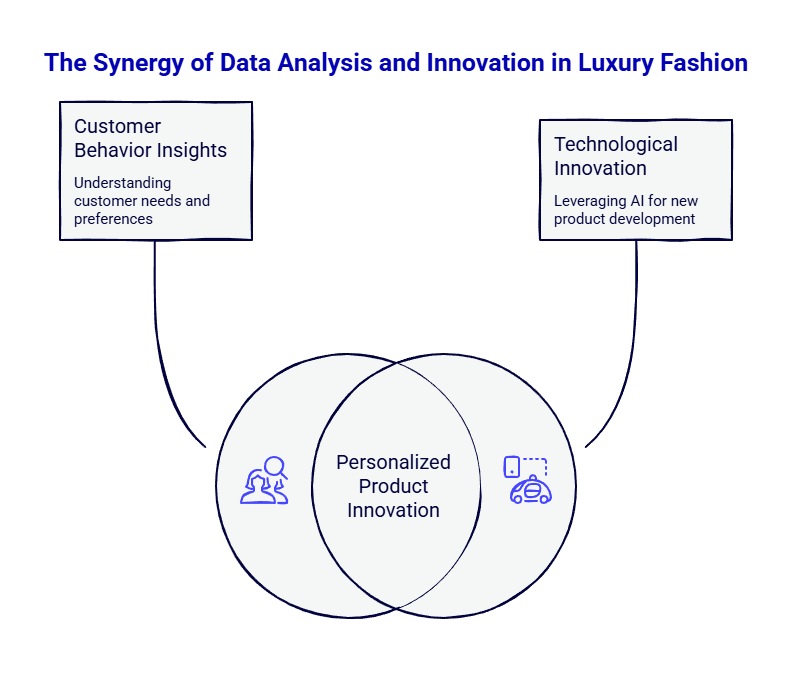Luxury brands make sure that they put their best foot forward when it comes to providing the best digital customer service. Online presence is not just about running ads, it is about posting compelling ideas that make the customer think about buying. The best brands do not sell products: they sell an idea.
For CX and Customer Support leaders in luxury and D2C fashion brands across the US, UK & Australia, digital service excellence is now a competitive differentiator. It’s no longer about the product alone. It’s about how effortlessly your brand supports and retains customers through 24/7 engagement.
Do you want to make it big in the business world with your online presence? It is not as hard as you think. All it requires is a clear plan regarding upscaling and marketing your products with a customer-centric approach. The marketplace is dynamic, and your online presence must not fall behind in reacting to current trends.
It is important to know how digital customer service works and how luxury fashion brands use it to their advantage and drive sales. Let’s explore what digital customer service means for modern fashion brands, what ensures customer success and the core strategies that drive loyalty and revenue in the high-end retail space.
What is Digital Customer Service?

Digital customer service is one of the most important factors for brand success because, according to data, half of customers switch to a competitor brand after only one bad customer service experience. Therefore, much remains at stake with such high rates of customer churn.
Therefore, it is important to provide support to customers through all the channels that they use. Providing a robust customer messaging platform is important, and additionally, in case of issues posted online, social media customer service must be offered in earnest. To sum it up, digital customer service is all about catering to customer queries after an ad campaign is run, or responding to issues faced by customers who have already invested in the brand. Quick and knowledgeable responses to queries make customers feel heard and valued, which can go a long way in building trust and credibility for a brand.
Atidiv’s fashion focused CX solutions combine omnichannel messaging, live chat and data-driven personalization to achieve over 98% accuracy in support workflows (see how Atidiv delivered 80% time savings, 50% cost reduction, and 99% accuracy for an NYC start-up).
What Ensures Success for Luxury Fashion Brands?

Several pointers spell success for luxury fashion brands. However, these are the ones that no business can go wrong with –
- A compelling brand narrative that ropes in customers
- Ensuring superior craftsmanship that impresses users
- Maintaining scarcity so that the exquisiteness quotient of the brand remains high
- Connecting with customers on an emotional level so that brand loyalty grows steadily
- Leveraging the power of digital marketing so that your brand becomes the talk of the town
- A superior customer service in fashion retail that makes customers feel valued
The last point among these is most important because 86% of customers are willing to pay an elevated price for a product if the customer service of the brand is good enough. Therefore, the value of a good customer service experience cannot be undermined. If you are looking to associate your brand name with superior customer service, opt for Atidiv’s services, such as digital marketing, social media support, or live chat service. With these services that personalise customer service and offer rapid resolution of issues, your business is sure to get a good boost in customer satisfaction.
For fashion and D2C CX leaders, partnering with Atidiv’s customer support and social media services delivers measurable uplift in CSAT and retention. Atidiv helped one global retailer save $450K annually while reducing staffing costs by 65%, read the full case study.
What Benefits does Digital Customer Service Have?

Digital customer service is the way to drive successful sales, principally because people increasingly rely on social media to learn about the trending brands. It is through social media that they form an opinion on ethical and sustainable brands and make purchase decisions with brands that align with their sensibility. In light of such market dynamics, let us try to understand what digital marketing features work for luxury fashion brands.
Personalisation
Luxury fashion brands can sell high-end products to a customer base that pushes their budget to afford them. The reason for such accommodating behaviour is that these brands make customers feel special and unique with superior customer service – getting it into their psyche that just as the products, they too are part of a chosen few. The price to pay for that might be slightly exorbitant, but who minds a little splurging for such mental upliftment? Furthermore, these brands offer
- Tailored Experience: Luxury fashion brands make sure that they humour you at all times. Doing so is possible through the ads they run on social media, taking the intended audience to their website. Now, visiting a website does not always mean sales conversion, however, there is a catch here. Brands can monitor social media usage behaviour and can track the times when you are more than likely to make a purchase. Furthermore, based on your purchase history, they suggest the products that you would be interested in. By using AI-powered customer data now, brands predict buying intent and tailor outreach for each shopper. It is also an approach enabled by Atidiv’s analytics-driven CX frameworks.
- Complete Virtual Shopping Experience: Virtual fitting rooms have become a trend with big brands, which is not unprecedented, with 79% of consumer product companies deploying AI tools for a superior virtual shopping experience. Especially, augmented reality and virtual reality tools are being used to elevate customer satisfaction while they make a purchase. With AI-driven customer support for retail introducing try-on features and more, brands do not let customers miss the satisfaction they get from a store visit. Augmented and virtual reality tools powered by visual AI enhance convenience and delight, helping brands maintain a luxury touch online.
- Data-driven Insights: Any luxury fashion brand worth its salt has a robust data analysis mechanism in place that tracks customer behaviour and gives important insights about their spending pattern. Such intensive research has taken the fashion industry forward with assured steps, and by the end of this year, the industry size will reach 1.3 trillion USD. Atidiv’s data operations deliver 95%+ accuracy in market intelligence processing, see how Atidiv enabled $20M+ savings for a leading business aggregator.
Omnichannel Integration
Fashion brands maintain a tactical poise between reaching out and non-engagement, which helps them retain their brand value in customers’ minds. This tacit art of maintaining social connection is something any business looking to upscale must learn from them. These are a few ways in which fashion brands pull it off:
- Maintaining Seamless Interactions: Any fashion brand, however big it might be, must reach out to its customers. Some do it visibly, while others are more subtle with it. However, they understand that the gap between the online stores and the brick-and-mortar stores must be bridged. Customers might want to visit the store to understand the look and feel of a product, despite all the AI-powered convincing done online. Therefore, the best practices must be followed, especially updating the website regularly with the arrival and the sellout of stocks.
- Ready Customer Support: However big the brand, customer support must be in place across all channels as far as possible. Responding to customer queries in time and solving the most pressing issues has a positive impact on the company’s reputation. Apart from Atidiv’s social media support, you must also have email services outsourcing and omnichannel messaging support that get back to customers’ queries ASAP. Luxury brands must maintain 24/7 omnichannel readiness across chat, email and social platforms.
- Social Media Presence: Fashion brands make sure that they interact with their customers on social media by creating engaging posts that hold their attention. Specifically, you use the visual impact that these social platforms have on people to prepare compelling ad campaigns for their products. Atidiv’s social media moderation teams ensure real-time engagement and compliance, maintaining consistent brand tone across platforms.
Data Analysis and Innovation

Most businesses, including luxury fashion brands, make it a point to stay ahead of the competition with their impeccable market research. With the advent of AI, market research can give businesses valuable insights about their customer base and potentially help unlock new markets with innovative product ideas. Thus, data analysis can serve three purposes:
- Understanding customer behaviour to drive sales
- Use of the latest technology to innovate products and impact customer experience
- Use research to reduce customer churn, retain customers, and enhance revenues
Finally, with innovative ideas like creating a virtual shopping assistant, retail businesses make sure that customers always have guidance while they buy products. This level of micro-assistance goes a long way in convincing a customer to make a purchase rather than opt for a competitor’s product. Thus, luxury fashion brands have customers scrolling on their app and exploring items rather than being fickle-minded about spending.
Atidiv’s AI-enabled customer analytics teams let CX leaders track buying trends and anticipate customer needs with precision, resulting in 98%+ QA scores for global retail clients.
Building Brand Loyalty
Luxury fashion brands build brand loyalty in three different ways based on their target audience and the reputation they have built over the years in the market.
- Heritage and Exclusivity: Think of a fashion brand like Gucci or Prada – century-old brands that do not need ad campaigns to attract new customers. An interesting fact about Gucci is that about half of its sales are driven by millennials, that is, people who are at present aged 35 years or younger. This example shows that a brand must know how to keep its charm alive for people to prefer it across generations. Brand exclusivity dictates brand value, and it can only come from such a strong hold over the market. People care for a rare item only because of its history, otherwise it is just a regular, ‘out of stock’ item.
- Emotional Connection: Luxury brands thrive when customers feel emotionally invested. Certain fashion brands have such importance with people on the emotional level that they are treated as family heirlooms. Take, for example, a Rolex watch – although it ropes in celebrities for promotion, does a Rolex really need an introduction? No, because its emotional value has been handed down through generations.
- Community Building: Elite customers value belonging. Luxury brand users consider themselves part of the elite who know how to manage their wealth, and nobody wants to look like the nouveau riche. Therefore, a sense of belonging is important for them, giving them the confidence that they deserve all that the brand stands for. Thus, brands focus on community building in one way or the other, because that is the way they built their legacy, and who would ditch a formula proven for success?
Atidiv’s CX frameworks help luxury and D2C brands build loyal communities through data-driven personalization and omnichannel engagement. Also empowering sustained brand trust.
Atidiv enables premium and luxury brands to elevate digital customer experiences through a perfect blend of human empathy and AI-powered efficiency.
From live chat and social media moderation to multilingual call center support, Atidiv delivers measurable ROI, consistent brand tone and exceptional CX quality.
Discover how Atidiv’s CX and customer care outsourcing solutions deliver 98%+ QA and measurable cost savings for global fashion clients:
- 99% accuracy & 80% time savings for a startup
- 65% employee cost savings for a major retailer
- 20M+ savings through scalable quality operations
FAQs On Digital Customer Service
1. Why is digital customer service as important for small businesses as it is for luxury fashion brands?
Digital customer service is important because it engages your customers on a regular basis, answering queries and fixing issues. For small businesses, digital customer service could be a game-changer because it would enhance customer satisfaction, effectively increasing customer retention and reducing customer churn.
2. How does one build brand loyalty as a new business enterprise?
For a new business to build brand loyalty is not an easy task to accomplish. Since they cannot leverage the saleability of a time-honoured reputation, they need to build one from scratch. The existing customer base must be retained with a good virtual sales mechanism, good customer support, and occasional rewards. If these strategies can be followed in a sustained manner, brand loyalty will grow steadily.
3. Why is omnichannel integration an important part of sales?
Omnichannel messaging support is important for your business because you need to keep all avenues open for customers to make their purchase. To work towards that end, your website must have the proper channel through which customers can move their requisitions to their nearest offline store. Integrated systems improve purchase flexibility and conversion rates, which are key for luxury and fashion eCommerce success.
